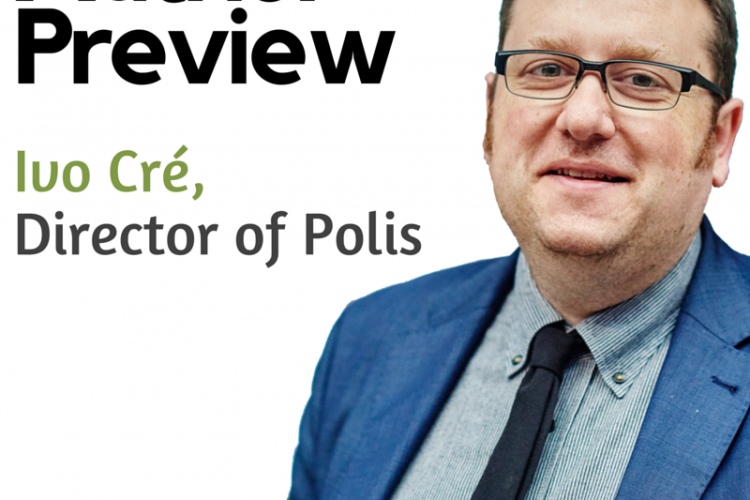Shaping smart cities
- Like
- Digg
- Del
- Tumblr
- VKontakte
- Buffer
- Love This
- Odnoklassniki
- Meneame
- Blogger
- Amazon
- Yahoo Mail
- Gmail
- AOL
- Newsvine
- HackerNews
- Evernote
- MySpace
- Mail.ru
- Viadeo
- Line
- Comments
- Yummly
- SMS
- Viber
- Telegram
- Subscribe
- Skype
- Facebook Messenger
- Kakao
- LiveJournal
- Yammer
- Edgar
- Fintel
- Mix
- Instapaper
- Copy Link
Posted: 7 April 2016 | Ivo Cré, Director of Polis | No comments yet
Ivo Cré provides a quick overview of the Polis smart cities position paper and gives a key example of smart cities in the Growsmarter Project.




Ahead of his article in Intelligent Transport Issue 3 2016, Ivo Cré – Director of Polis (EU Network of Cities and Regions working on innovative urban mobility solutions) provides a quick overview of the Polis smart cities position paper and gives a key example of smart cities in the Growsmarter Project.
The transport sector is currently shaping and experiencing a paradigm shift, with coinciding transitions in the field of energy use by deploying electric modes of public transport, smart and integrated transport systems and behavioural change with a current emphasis on the sharing economy and active travel modes. These changes affect passenger as well as freight transport, business as well as leisure travel. This paradigm shift can be directed to achieving ‘Smart City’ objectives such as stimulating the local innovation market, mainstreaming best available technologies and knowledge-based decision-making.
On a global scale, cities and industry are developing coherent operational tools to better plan and manage the urban territory and improve quality of life for citizens. These tools are the practical translation of a deeper understanding of interdependencies and synergies between sectors such as transport, energy, urban planning, economic development, environment and health. The interrelation between all these domains is what constitutes a ‘Smart City’, which is able to link all these aspects in order to serve citizens on their daily commuting and travel options.
The EU is addressing the challenge to make cities smarter by means of a package of instruments: research and innovation with funding EU programmes, policy development and community building through the European Innovation Partnership Smart Cities and Communities, and finance, in combination with the European Investment Bank, the Connecting Europe Facility Programme and the European Fund for Strategic Investments.
This is where specific ongoing European projects such as the Growsmarter Project come as a tool to better upscale and disseminate good practices assessed by 50 public and private partners for future smart cities. One of the key components of this project is the deliverable of local electric charging infrastructure that constitutes the backbone of electric private vehicles, be it for public fleet, private use or car-sharing schemes. Currently in deployment in Barcelona and Stockholm based on several preliminary studies, cross benefit analysis and urban mapping, these infrastructures will serve as an incentive for millions of citizen to change their lifestyle toward a more sustainable urban transportation system. It will improve urban mobility in terms of energy efficiency and environmental performance for air quality and noise reduction.
Transport has a lot to offer to the Smart City. Polis wants to ensure that local urban mobility stakeholders can take their full responsibility in co-creating the Smart City and pursuing Smart City objectives, without transport being made subsidiary to other sectors, such as energy. This can be the basis for appropriate EU institutional arrangements to support local transport actions in Smart Cities.
|
Read more about the position of Polis and transforming cities for a smart, sustainable future in Intelligent Transport Issue 3 2016 (published in June) by clicking here to sign-up and receive your free print or online subscription. |
_____________________________________________________________________
Alongside Ivo in our Smart Cities Supplement, other articles and authors will include:
- How public transport networks can contribute to the smart cities of the future, by Marko Forsblom, CEO of ITS Finland
- Cyber security for smart cities by Cédric Lévy-Bencheton, Network and Information Security Expert at the European Union Agency for Network and Information Security (ENISA)
- Smart city culture in Malmo, Sweden by Malena Möller, Traffic Planner at Malmo Municipality.
_____________________________________________________________________
Related topics
Intelligent Transport Systems (ITS), Multimodality, Ticketing & Payments
Related organisations
Polis







